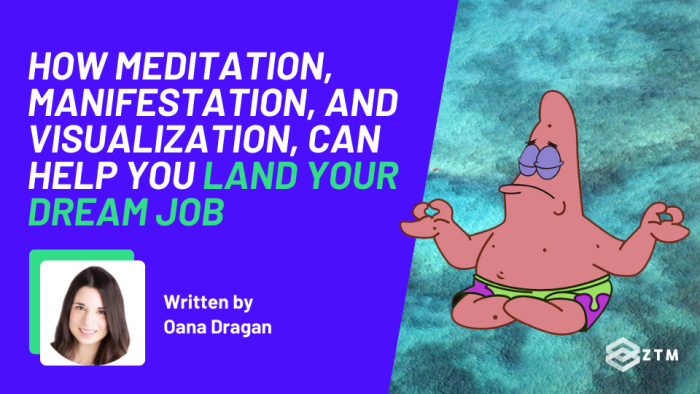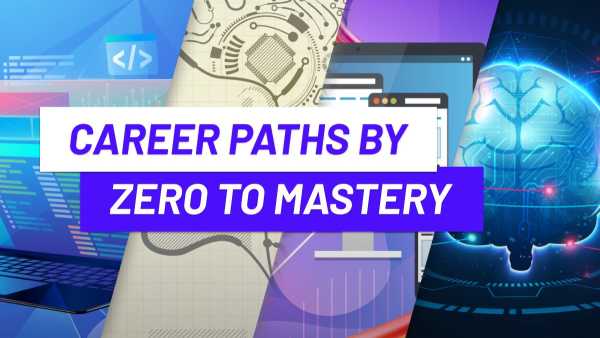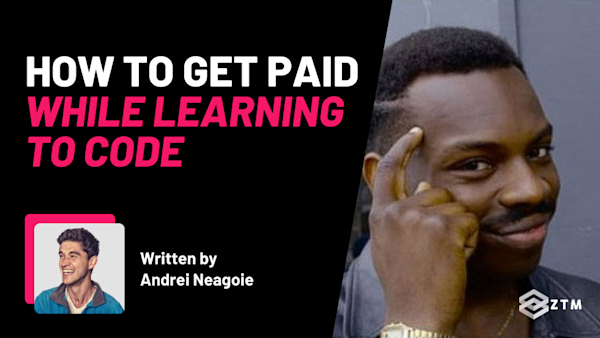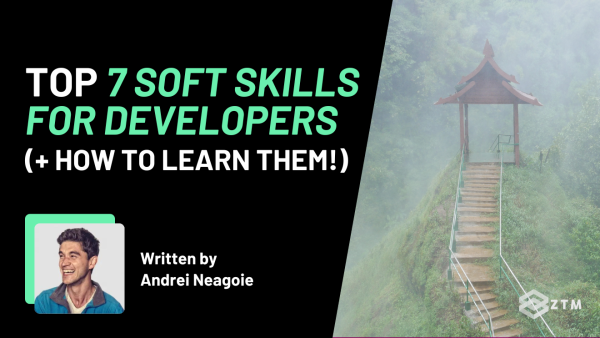Yes, you read that title correctly. It’s not clickbait.
I'll admit that it seems a little 'woo woo' but bear with me because although it all sounds very new age, the principles and systems are very similar to what we already use in programming. We just use different terms such as ‘computational thinking’, Kanban, and others.
And don’t worry, I’m not going to propose you go out and buy crystals or a dream catcher, so just stick with me here.
In this article, I’m going to break down these 3 tools (mediation, manifestation, and visualization), why they work, and how you can use them to manifest your dream job.
And along the way, hopefully you'll start to see these soft skills in a brand new way.
So let’s break it down…
How to use meditation to ace your coding interview
Not only can meditation help you be more relaxed, efficient, and effective, but it can also help you land your dream job by helping you ace your coding interview.
How?
Well, let’s be honest here and agree that most people don’t enjoy interviews. In fact, we dread them as they can trigger a lot of stress.

Our hearts beat faster, our bodies sweat, our hands tremble and our breathing becomes shallow.

These are all signs that our bodies are preparing to run away or stand and fight, and if we were actually in any real danger, this could save our life.
We call this the “fight or flight” response and its purpose is to protect us from any perceived threats and in doing so, help us avoid harm.
So when you think about it, our stress doesn’t want to hurt us, it wants to protect us. The only problem of course is that these responses would have been useful for cavemen faced with a tiger looking for its next meal, but they aren’t so useful when it’s just you sitting across from your interviewer trying your best to make a good first impression.

The interviewer is clearly not trying to eat you for lunch, yet your body reacts as if they are.
Now if we nerd out a little bit and get abstract, this broken response to false data is an almost identical example of a system running on conflicting code as new hardware gets updated.
So what would we do as coders in this situation?
Well, in the programming world, the chances are high that we would either be aware of this issue and ignore it build systems around it, or we would try and remove the cause.
This is the same thing that meditation can do for your own hardware. It can help you to remove or reduce that fight or flight response so that you get that job because let’s face it, whether you like them or not, interviews are an inevitable process of getting hired.
You can’t run away from them and so the best we can do is show up prepared.
Not just by practicing and knowing the answers to common coding interview questions, but by also improving our performance under that pressure.
Here are 4 easy methods you can use to ace your interview and reach your goals.
Method #1️. Use meditation to lower your stress in advance
Multiple studies have shown that people who meditate regularly are more likely to have a better handle on their emotions in stressful situations.

This means that somebody who has been meditating consistently in the lead-up to a programming interview will find it easier to be present and focused on what can go right as opposed to being anxious and nervous about what can go wrong.
Yes, they may still experience nerves but they are better at dealing with them so that they don’t negatively impact their performance as much.
tl;dr
Practice meditating daily right now if possible, but failing that, try meditating a week or more before your interview. This can help reduce some of those nerves in advance and build up that tolerance to coping with stressful situations.
Method #2️. Use meditation to practice emotional detachment in the moment
In the last method, we started to reduce the potential emotions that we might feel, but here we’re looking at how to deal with them better when they occur.
How?
By using meditation to become an observer of your thoughts and feelings as opposed to being overly identified with them.

This is not about being cold or unfeeling or even ignoring the situation but simply changing how you process and respond to the stimulus instead.
This detachment creates space between you and your emotions so that they no longer have as much control over you.
It seems simple because it is, but by learning to consciously witness and breathe through negative reactions, you can turn stress into calm, anxiety into peace, and overthinking into groundedness.
So next time you find yourself in a state of panic while waiting to be interviewed, try acknowledging how you feel so that you can step outside of it.
For example, “I am observing panic”.
Important: Notice that you’re not saying “I am panicking” but rather “I am observing panic”.
Language is everything here. You aren’t the personification of panic itself, you are simply experiencing it momentarily.
And as we all know, feelings can leave as quickly as they come if you let them, especially if you can start using techniques to remove some of the causes.
Method #3️. Use box breathing to control the trigger of anxiety and relaxation
Now that you’ve observed that emotion, here’s how to remove it by resetting yourself, and tricking your nervous system to be calm.
How?
Our bodies have a hardwired response to stress, in that our breathing becomes shallow when under threat. The thing is, it’s kind of a chicken and egg situation. Even if we’re not under stress, by having short sharp breathing, we can simulate stress and start to feel anxious.

Give it a try if you feel like being crazy anxious. Try some short sharp breathing and see how it starts to affect your stress levels.
The cool thing however is that opposite is also true, and by controlling our breathing and making it deeper and slower, we can also remove actual stress and anxiety.
So when you observe that stressful emotion starting to build, step outside your feeling and shift your attention to your breath.

More likely than not, your breath has quickened, so take a moment to slow it down.
- Inhale for a count of 4
- Hold that breath in your lungs for a count of 4
- And then exhale back out while again counting to 4, and then start the whole process again

Repeat this pattern 4 times while paying close attention to the rise and fall of your chest.
You don’t need to close your eyes if you don’t feel comfortable, just simply notice how you are breathing and pay careful attention to how each breath flows in and out.
This box breathing technique may sound simple, but it is extremely powerful in helping you manage your stress levels in high-pressure situations.
In fact, it's so effective that Navy SEALs use it to help them stay calm under pressure in high-stress, life and death situations!

You don’t even need to be going in for a job interview to reap the benefits of box breathing, because it’s a powerful tool you can use to deal with almost any stressful situation.
And as we all know, in the world of coding there are many times when you want to put your foot through your monitor!

Psst...
If you want to dive deeper into meditation and learn numerous new techniques such as Box Breathing, Progressive Muscle Relaxation, and Morning & Evening Meditations, I’ve created a Meditation Guide for Programmers.
And if you want to check it out and try for free, go ahead and give my box breathing meditation technique a go here.
Bonus: How meditation can also help you keep your job once you get it
An interesting side effect of meditation is that it also helps us be more emotionally intelligent and better able to tune into the emotions of others and adjust our behavior according to the situation before us.
Why care?
Well, this means that high emotional intelligence not only helps us to land the job, but it also helps us fit into it too, and this is precisely what employers are looking for, because they don’t want just someone qualified to do the job, but someone who fits in and meshes with the team.
This is why FAANG/MAANG companies not only encourage their employees to meditate, but also provide them with the tools and resources to get started, so you may as well jump on the bandwagon now before you even join the team!
How to use visualization to manifest your goals and dream job
OK so these may seem very crystals and dreamcatchers, but visualization and manifestation, when done correctly, are simply goal setting and planning with a bit of biology thrown in to make it work.
For example
- You imagine a goal you want to achieve
- Then you break down all the steps to make that happen, you work through each one, and you keep the end goal in sight so that you can finish the work
- You visualize what needs to happen and how it will all come together
Simple right? The thing is, there’s a little bit more to it than that, and again, it comes down to our own internal hardware and a few little issues that it has that cause it to run incorrectly.
So let me explain
In the lead-up to an interview, you may find your mind conjuring up all the worst-case scenarios it can think up, including any bad experiences you may have had in the past.

Unfortunately, our minds have a knack for seeing everything that can go wrong and it isn’t very helpful to us. There is a name for this phenomenon and it’s called "negativity bias".

In a nutshell, negative events and experiences not only imprint more quickly in us, but they also stick around longer than positive ones, which sucks for us, especially in today's environment.
You see this bias worked great in our hunter and gatherer days, as we certainly wanted to remember which plants were poisonous vs. which were safe for us to eat, and it's not like we could just Google it 😜.

However, this trait is not really relevant or useful today, as it just causes us a lot of stress for no real reason.
What do I mean?
Well thanks to our evolutionary need to survive and avoid danger at all costs, things of a negative nature tend to have a greater effect on our psychological state and processes than neutral or positive events.
Sucks right?
So basically we're far more likely to recall and dwell on something bad that happened to us, even if something even better has happened.
You could have had a great day of learning how to code, but then you came up against a problem that you just couldn’t resolve, and then it just throws off your day.
You end up remembering that single issue as the entire focus, when in fact, the majority of the sprint was quite positive overall.
The worst part is that cycling through negative experiences inevitably takes a toll on our emotions and even ends up impacting our behavior, our decision systems, our self-belief, and even our cognitive functions which is not what we want going into an interview, or trying to complete a goal.
Curse you, outdated brain code!

All joking aside, now that we know about this and how it affects us, we can start to deal with it.
Method #4️. How to remove your negative bias from any goal
So here’s how to remove those negative thoughts, and it’s the same method used by top performers in multiple fields.
All you need to do is simply visualize the best possible scenario for your goal and then work through it in your mind while removing the negative thoughts.
I know it seems super simple but hear me out here:
For example
You will have no doubt seen athletes using visualization techniques before performing an important task, such as shooting a game deciding free throw.
The reason they do this is not superstition, but instead they are priming the muscle memory to shoot correctly.
They see in their mind the exact way their muscles need to move, having performed the same task thousands of times.
The thing is, if they didn't do this, they might get in their own head with those self doubts and start thinking of how they might miss. And the irony? By visualizing their body moving in a way that they miss the shot, their muscles perform that way and they mess up!
Visualization really is that effective, and it's not just for immediate tasks either.
Olympic runners visualize themselves crossing the finish line, and the time they do it in.
Not only that, they take it further and visualize all the steps it takes to get there. The training each day, the diet, the sacrifices.
This visualization helps them to stay on task and achieve their goals and can even improve their performance when training!

Visualization is incredibly powerful and there’s no reason why you can’t use it to achieve your own goals also.
To be clear, I'm not talking about ‘the secret’ and wishing things to happen. Instead, this is about seeing the success you wish to ‘manifest’ and achieve so that it not only motivates you and removes any ‘what ifs' or self-doubts and negative bias, but also inspires your own ideas on how to turn your dreams into reality.
For example
You can mentally rehearse how you want your interview (or project) to go and in doing so, have it far more likely to turn out that way.
Your mind is a powerful tool in helping you attract both what it is you desire and don’t desire. It depends on what you choose to place your focus on:
- You can allow your fear to take over the best of you and imagine the worst, such as showing up late to the interview, having intimidating and unfriendly interviewers, being unsure of how to answer questions
- Or you can create visuals in your mind of accomplishing exactly what you do want: showing up on time, having kind and welcoming interviewers, answering questions with ease and flow. The choice is yours!
It may not always be so easy to think positively, but with visualization, you learn to focus on good outcomes over bad ones and not let that negativity creep in and poison your efforts.
By envisioning your success, as opposed to your doom and gloom failure, you are one step closer to achieving your goal…what once seemed impossible is now possible!
And some good news?
To help you better prepare for your big interview day, I've gone ahead and created a powerful guided meditation and visualization training for you to follow, that will not only calm and center you, but will also support you in creating a clear mental image of how you would like your meeting to go.
Boom! You'll head into that interview with the confidence of a venom suited spiderman.

Trust me when I say that mindset is absolutely crucial in helping you land your dream job. You need to truly believe in your mind and heart that you will be the best candidate on their list, and the easiest way is to start removing those 'what ifs'.
Sometimes our subconscious needs a bit of TLC (tender love and care) before we truly believe something, so I recommend listening to this recording daily for at least a week before your interview!
⚔️ Editor's note:
This really does work. When I first started transitioning from a 4 figure to a 6 figure job, I had so many self limiting beliefs about what I could do, the money, what my friends would think, etc.
To get over it and pump myself up to just do the work, I recorded myself saying positive statements and then dubbed it over the top of the Conan the Barbarian theme song...

It was incredibly cheesy but it worked. I just wish that I would have had this meditation to listen to instead!
So what are you waiting for? Start meditating and manifesting your goals today!
Hopefully, by now you see the benefit of meditation, manifestation, and visualization for getting a job or achieving your goal.
It may take a little while to put into practice and the effects may not be immediate, but they soon add up and there’s no loss to work on them.
At the end of the day, even if you don’t end up landing the job, at least you’ve approached the interview with a calmer and more focused mind than you ever have before, which let's be honest, can make the experience far more enjoyable.
Keep this up and it will only be a matter of time before you land the perfect role for you. Visualize it and it’s yours!
And with that, I wish you all the best with your interview! Keep us posted on how it goes, so we can all virtually celebrate you.


![Learning to Meditate [Productivity & Focus]](https://images.ctfassets.net/aq13lwl6616q/2a7NI2zgRFphCk8pnDHBYF/34433f9991c8952427f112d428014bc6/Meditation_Thumbnail_2-_Academy.png?w=600&h=335&q=50&fm=png&bg=transparent)



